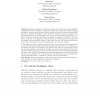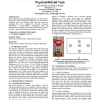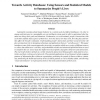327 search results - page 13 / 66 » How to Evaluate Social Intelligence Design |
JUCS
2010
13 years 7 months ago
2010
Abstract: Ambient Intelligence (AmI) has emerged in the past 10 years as a multidisciplinary field within ubiquitous computing, attracting considerable research, funding and publi...
CSCW
2008
ACM
13 years 10 months ago
2008
ACM
Within a group of peers, it is often useful or interesting to know whether someone in the group has gone to bed or whether they have awakened in the morning. This information, nat...
SOUPS
2005
ACM
14 years 2 months ago
2005
ACM
In this article, we describe the design process of Reno, a location-enhanced, mobile coordination tool and person finder. The design process included three field experiments: a ...
HRI
2009
ACM
14 years 3 months ago
2009
ACM
We describe the design and implementation of a socially assistive robot that is able to monitor the performance of a user during a combined mental and physical task, with the purp...
DEBU
2006
13 years 8 months ago
2006
Automated reasoning about human behavior is a central goal of artificial intelligence. In order to engage and intervene in a meaningful way, an intelligent system must be able to ...




